NPR’s Forest Elephant Stories: Additional Sound and Video
May 7, 2014
Andrea Turkalo has studied elephants at Dzanga Bai for 24 years. 
Turkalo knows most of the elephants, including this 22 year old, Miss L. 
Turkalo with Bayaka helpers Zou, Melebou, Koto, and Mbanda. 
In 2002 Turkalo moved from the rickety platform at left to a newer lookout. 
Recordist Bill McQuay used mosquito netting to keep bugs away from the microphones. 
Elephants visit the bai for mineral-rich waters and to spray themselves with colorful mud. 
Elephants share the bai with rare bongo antelope. 
A female tends to a young calf, less than a year old. 
A mother elephant walks with two calves about 4 years apart in age. 
A mother elephant with her 20-year-old daughter.
Andrea Turkalo has been studying the rare African forest elephant in the Central African Republic since 1990. Last year, she had to flee her longtime study site, Dzanga Bai, as armed rebels and eventually poachers moved into the area, and she has yet to return. A pair of National Public Radio stories aired her story during Morning Edition on May 8 and on May 9, 2014. We’ve gathered the following materials to help immerse you in the sights and sounds of this remarkable clearing in the jungle.
Listen to the Original Stories
In 2002, the NPR show Radio Expeditions visited Turkalo at her Dzanga Bai study site. Here are the original recordings.
The Cornell Lab of Ornithology’s Macaulay Library is the repository for the National Public Radio–National Geographic Society Radio Expeditions Sound Collection. You can hear much more of their recordings and interviews from Dzanga Bai in our archive.
Sounds From Dzanga Bai
Immerse yourself in life at Dzanga Bai with these ambient sound recordings, by Radio Expeditions sound recordist Bill McQuay (now a sound engineer at the Cornell Lab).
Video of Elephants by Day and Night
About the Scientists
 Andrea Turkalo is a biologist with the Wildlife Conservation Society. She has been studying forest elephants at Dzanga Bai since 1990. She works closely with the Elephant Listening Project at the Cornell Lab of Ornithology.Photo courtesy Peter Wrege/ELP.
Andrea Turkalo is a biologist with the Wildlife Conservation Society. She has been studying forest elephants at Dzanga Bai since 1990. She works closely with the Elephant Listening Project at the Cornell Lab of Ornithology.Photo courtesy Peter Wrege/ELP. Peter Wrege leads the Elephant Listening Project at the Cornell Lab. He has spent three decades studying animal behavior in the tropics and has spent much of his time in Kenya and East Africa. Photo courtesy Peter Wrege/ELP.
Peter Wrege leads the Elephant Listening Project at the Cornell Lab. He has spent three decades studying animal behavior in the tropics and has spent much of his time in Kenya and East Africa. Photo courtesy Peter Wrege/ELP. Katy Payne is a researcher and naturalist interested in animal sounds. She began her career studying the sounds of humpback whales. She became interested in elephant communication and founded the Elephant Listening Project in 1999, retiring in 2006. Photo (1990) courtesy Peter Wrege/ELP.
Katy Payne is a researcher and naturalist interested in animal sounds. She began her career studying the sounds of humpback whales. She became interested in elephant communication and founded the Elephant Listening Project in 1999, retiring in 2006. Photo (1990) courtesy Peter Wrege/ELP. Bill McQuay (left, with Alex Chadwick, at the Dzanga Bai platform) is the supervising audio engineer for the Cornell Lab’s Macaulay Library. He was a sound engineer and technical director for NPR for 15 years. Photo (2002) by Carolyn Jensen-Chadwick.
Bill McQuay (left, with Alex Chadwick, at the Dzanga Bai platform) is the supervising audio engineer for the Cornell Lab’s Macaulay Library. He was a sound engineer and technical director for NPR for 15 years. Photo (2002) by Carolyn Jensen-Chadwick.
More About Forest Elephants
- Description of Dzanga Bai
- Map of forest elephant study sites
- About the Elephant Listening Project’s thermal imaging research
- Read these Elephant Listening Project field reports from a 2010 expedition
How to Help
Please donate to the Elephant Listening Project or adopt a forest elephant to help this important research and conservation continue

All About Birds
is a free resource
Available for everyone,
funded by donors like you
American Kestrel by Blair Dudeck / Macaulay Library
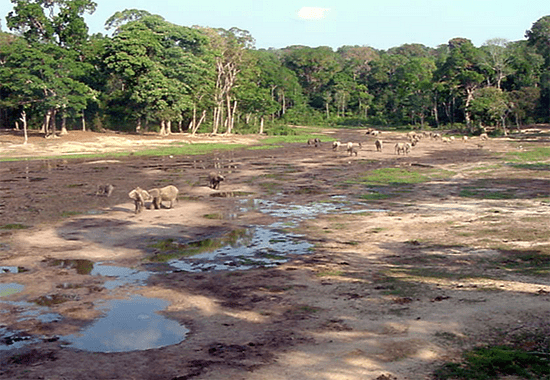
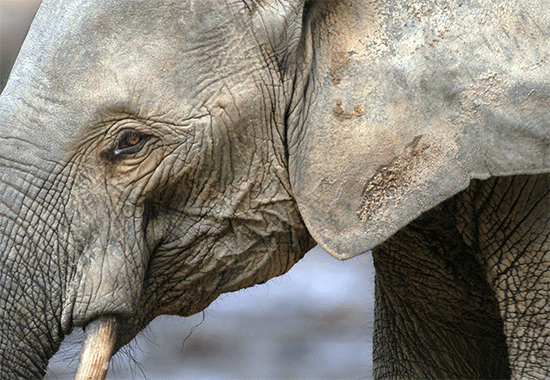
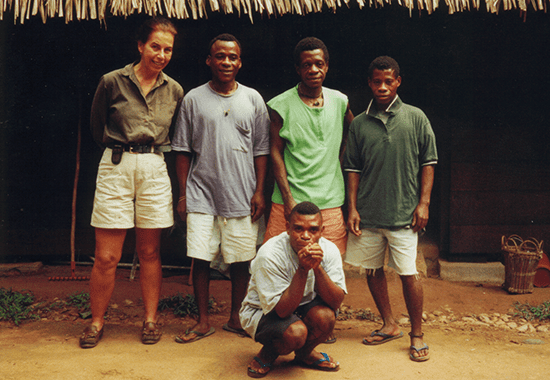
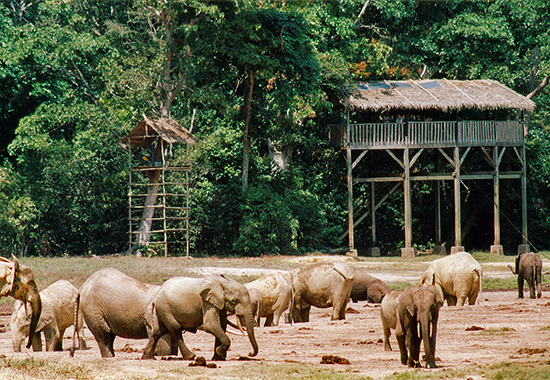
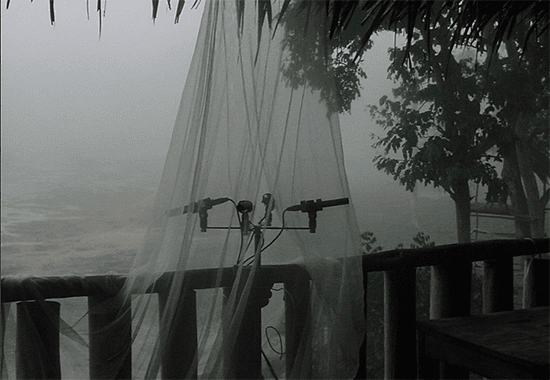
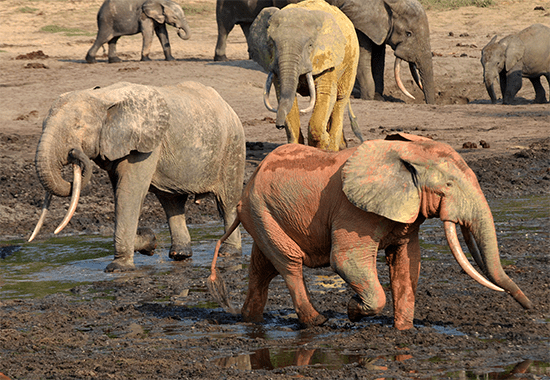
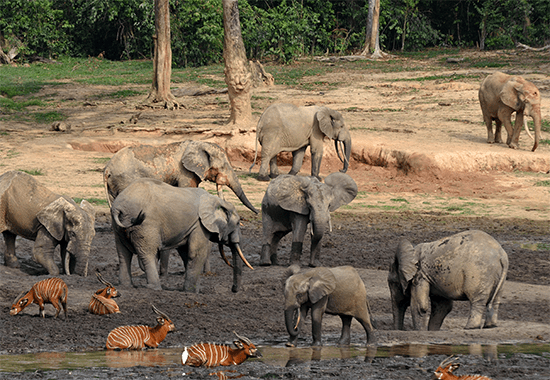
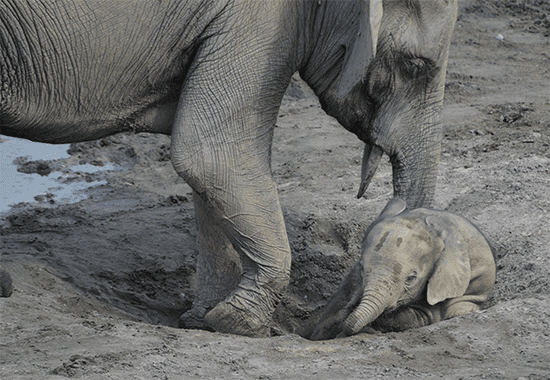
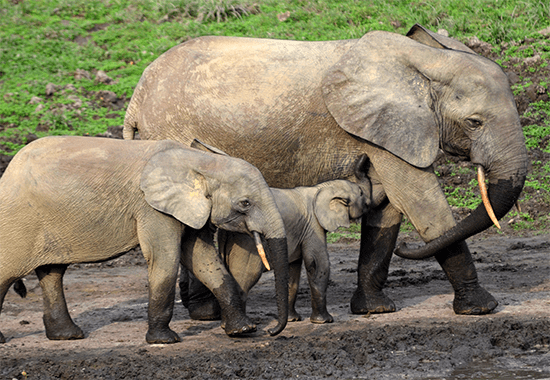
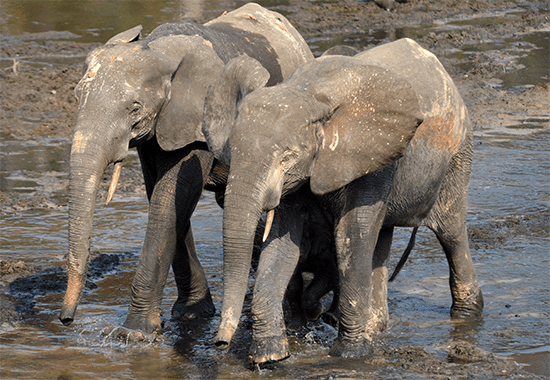
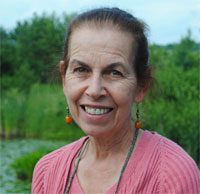 Andrea Turkalo is
Andrea Turkalo is 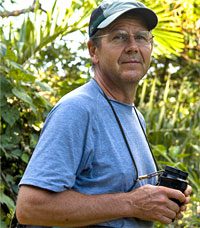 Peter Wrege leads the
Peter Wrege leads the 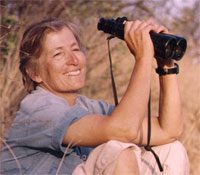 Katy Payne is a researcher and naturalist interested in animal sounds. She began her career studying the sounds of humpback whales. She became interested in elephant communication and founded the Elephant Listening Project in 1999, retiring in 2006. Photo (1990) courtesy Peter Wrege/ELP.
Katy Payne is a researcher and naturalist interested in animal sounds. She began her career studying the sounds of humpback whales. She became interested in elephant communication and founded the Elephant Listening Project in 1999, retiring in 2006. Photo (1990) courtesy Peter Wrege/ELP.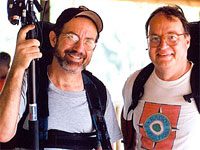 Bill McQuay (left, with Alex Chadwick, at the Dzanga Bai platform) is the supervising audio engineer for the Cornell Lab’s
Bill McQuay (left, with Alex Chadwick, at the Dzanga Bai platform) is the supervising audio engineer for the Cornell Lab’s